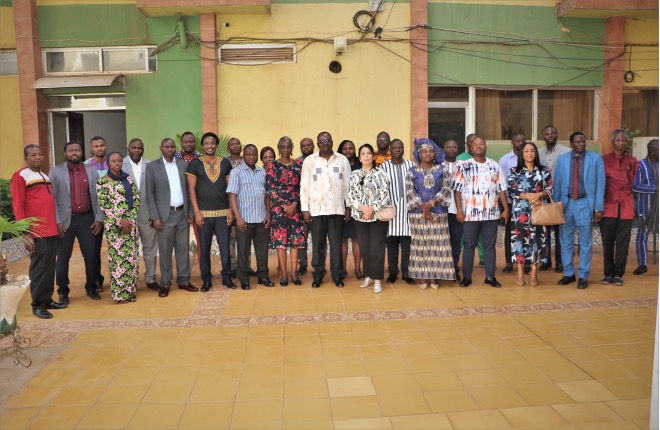
Ouagadougou, Burkina Faso, 28 November 2024 – The Global Center on Adaptation (GCA), in partnership with Kenya's Akiba Mashinani Trust (AMT) and United Cities and Local Governments of Africa (UCLGA), hosted a peer-to-peer learning exchange in Ouagadougou, Burkina Faso. Held from 26 to 27 November 2024, the event convened 25 representatives from local and national governments to tackle the growing challenges of climate adaptation in informal settlements.
The exchange drew on GCA and AMT's pioneering People’s Adaptation Planning process in Mukuru, Nairobi, Kenya, which empowers communities through locally led planning. Participants explored innovative tools such as community-driven data collection, mapping, and multi-sectoral collaboration. The aim: to adapt these best practices to Ouagadougou’s "spontaneous settlements," which face increasing risks from flooding, extreme heat, and displacement exacerbated by climate change.
Urgent Call for Climate Action
 H.E. Maurice Konate, President of the Special Delegation of the Municipality of Ouagadougou, emphasized the city’s urgent need for action: “Floods in Ouagadougou are more frequent now compared to previous years, which I attribute to climate change. I welcome any intervention that can help mitigate climate change, and I will engage with leadership to support this process.”
H.E. Maurice Konate, President of the Special Delegation of the Municipality of Ouagadougou, emphasized the city’s urgent need for action: “Floods in Ouagadougou are more frequent now compared to previous years, which I attribute to climate change. I welcome any intervention that can help mitigate climate change, and I will engage with leadership to support this process.”
Echoing this, H.E. Roger Baro, Minister of Environment, Water and Sanitation of Burkina Faso, pledged to support locally led adaptation efforts, stating: “I am committed to supporting climate adaptation measures that deliver tangible benefits to the residents of Ouagadougou.”
Field Visits Highlight Solutions and Challenges
Participants toured Ouagadougou’s key climate initiatives, including the Tanghin drainage system, designed to manage floods and promote urban greening, and the Bangr-Weoogo urban park, a multifunctional green space vital to the city’s resilience. They also visited the Polesko informal settlement, where inadequate infrastructure and services underline the pressing need for locally driven solutions.
Laying the Foundation for Locally Led Plans
The exchange concluded with a consensus on the importance of robust data collection in Ouagadougou’s informal settlements to guide the development of comprehensive adaptation plans. Proposed priorities include improving infrastructure, addressing urban sprawl through vertical development, and expanding green spaces.
The collaboration paved the way for further exchanges, with key officials from Ouagadougou set to visit Nairobi and Homa Bay, Kenya, to deepen their understanding of community-based climate adaptation strategies.